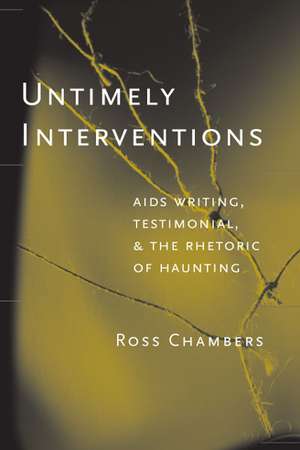Untimely Interventions: AIDS Writing, Testimonial, and the Rhetoric of Haunting
Autor Leigh Ross Chambersen Limba Engleză Hardback – 2 sep 2004
As atrocity has become characteristic of modern history, testimonial writing has become a major twentieth-century genre. Untimely Interventions relates testimonial writing, or witnessing, to the cultural situation of aftermath, exploring ways in which a culture can be haunted by its own history.
Ross Chambers argues that culture produces itself as civilized by denying the forms of collective violence and other traumatic experience that it cannot control. In the context of such denial, personal accounts of collective disaster can function as a form of counter-denial. By investigating a range of writing on AIDS, the First World War, and the Holocaust, Chambers shows how such writing produces a rhetorical effect of haunting, as it seeks to describe the reality of those experiences culture renders unspeakable.
Ross Chambers is Professor of Romance Languages at the University of Michigan. His other books includeFacing It: AIDS Diaries and the Death of the Author.
Ross Chambers is Professor of Romance Languages at the University of Michigan. His other books includeFacing It: AIDS Diaries and the Death of the Author.
Preț: 565.88 lei
Preț vechi: 665.73 lei
-15% Nou
Puncte Express: 849
Preț estimativ în valută:
108.33€ • 111.41$ • 89.87£
108.33€ • 111.41$ • 89.87£
Carte indisponibilă temporar
Doresc să fiu notificat când acest titlu va fi disponibil:
Se trimite...
Preluare comenzi: 021 569.72.76
Specificații
ISBN-13: 9780472098712
ISBN-10: 0472098713
Pagini: 456
Ilustrații: 3 B&W photographs
Dimensiuni: 152 x 229 x 30 mm
Greutate: 0.73 kg
Editura: UNIVERSITY OF MICHIGAN PRESS
Colecția University of Michigan Press
ISBN-10: 0472098713
Pagini: 456
Ilustrații: 3 B&W photographs
Dimensiuni: 152 x 229 x 30 mm
Greutate: 0.73 kg
Editura: UNIVERSITY OF MICHIGAN PRESS
Colecția University of Michigan Press
Descriere
Explores testimonial writing as it advances a provocative new theory of culture, trauma, genre, and denial
